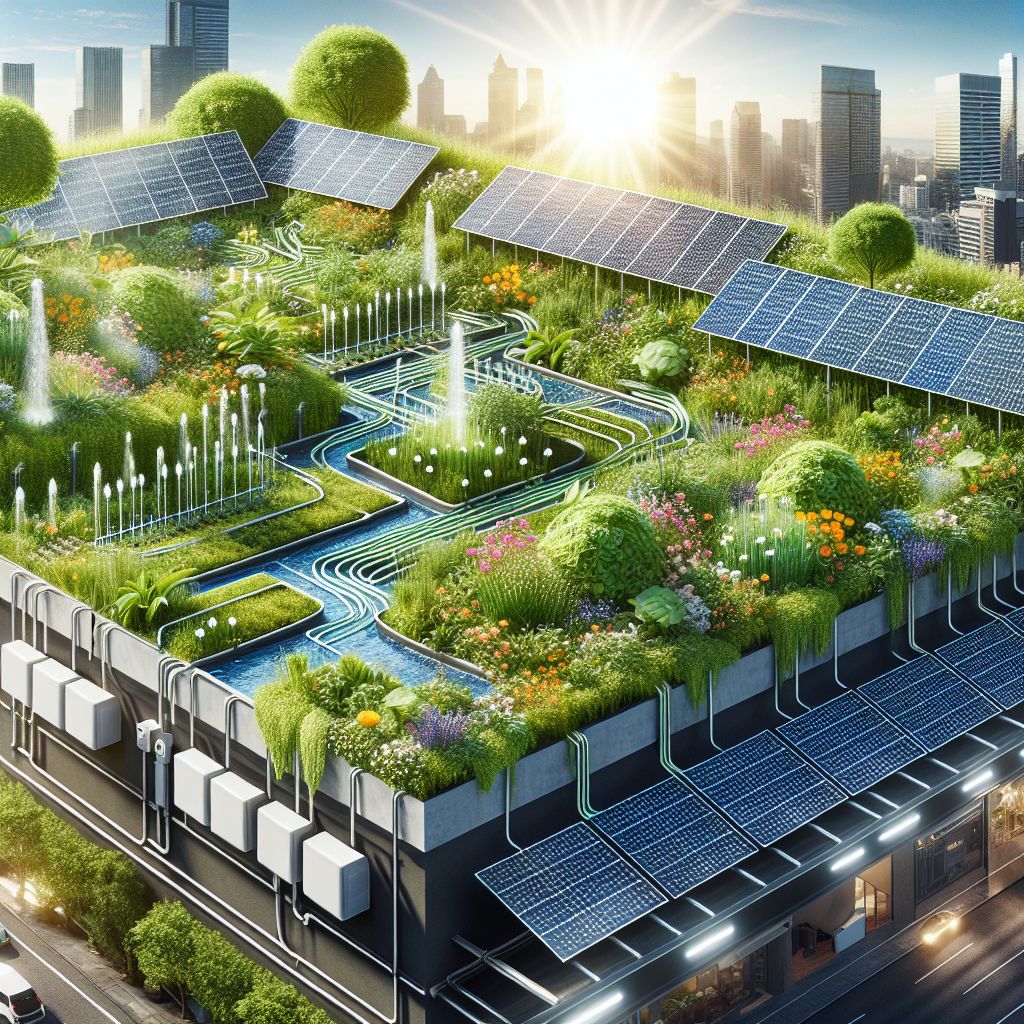
Key Takeaways
Setting up a rooftop solar irrigation system can drastically lower water and energy usage.
The main components of an efficient rooftop garden irrigation system are solar panels and an appropriate drip or sprinkler system.
Using solar energy for rooftop garden irrigation can result in significant utility bill savings.
Environmental advantages include preserving natural resources and contributing to a greener urban environment.
Solar irrigation systems are a financially feasible option due to government incentives and the potential for long-term savings.
Catch the Sun: Unpacking Rooftop Solar Irrigation
Picture a thriving, colorful garden blooming on top of a city building, where the sunlight’s play across the green leaves does more than simply fuel photosynthesis. It also provides power to the very system that irrigates the plants—a rooftop solar irrigation system. With the proper setup, your rooftop can become a symbol of sustainability, combining the natural growth process with the innovative application of solar power.
So, how can you use the sun’s energy to maintain a rooftop garden? Let’s discuss the basics of setting up an effective solar irrigation system for your rooftop garden and look at the many advantages of this environmentally friendly option.
Can you use a Solar Irrigation System on a rooftop garden?
Yes, you can and it’s very advantageous to use a solar irrigation system on a rooftop garden. The trick is to combine solar panels with a watering system—either drip irrigation or sprinklers—to make sure your plants get the water they need, powered completely by solar energy. This system is especially good for urban environments where space is limited and sustainability is an increasing worry.
Using Solar Energy to Power Your Rooftop Garden’s Irrigation System
The solar panel is the key component of a solar-powered irrigation system. It harnesses the power of the sun and transforms it into electricity. This electricity then fuels a pump that disperses water throughout your garden’s irrigation system. No matter if you’re cultivating herbs, vegetables, or decorative plants, a solar irrigation system can be customized to accommodate the unique requirements of your rooftop garden.
Essential Parts of a Rooftop Solar Irrigation System
When setting up your solar irrigation system, the first thing you need to do is choose the right solar panels. They should be strong enough to power the pump that will distribute water to your garden. The second key part is the irrigation system itself. You can choose a drip system for more efficient water use or sprinklers for a wider reach. Finally, you need a battery to store the solar power. This way, your garden can still get water even when the sun isn’t out.
Solar panels that harness and transform sunlight into electrical energy.
A water pump that propels water throughout the system.
Drip or sprinkler irrigation system to distribute water evenly across your garden.
Battery storage to supply power during periods when sunlight is not available.
Charge controller to prevent batteries from overcharging.
When combined, these elements form a flawless solar irrigation system that not only saves water but also leverages the sun’s renewable energy, epitomizing efficiency and sustainability.
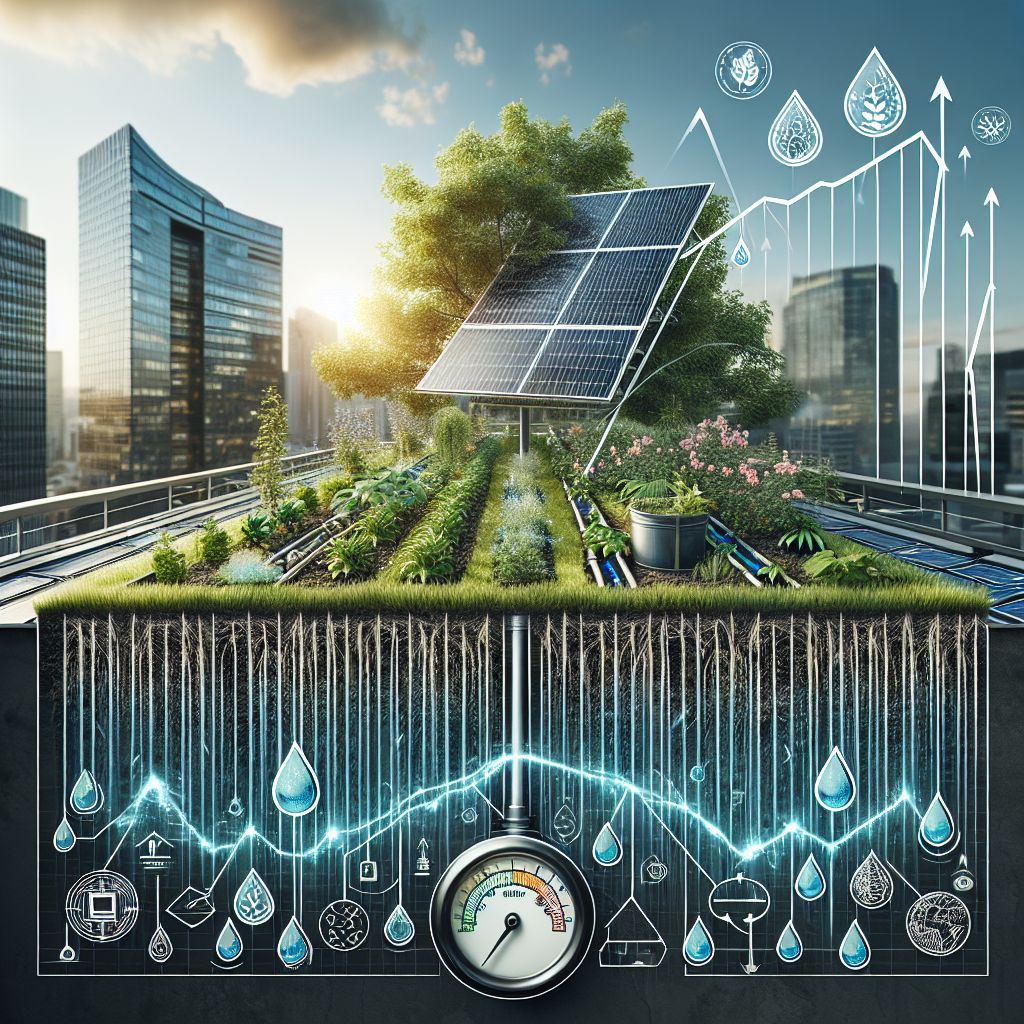
Why Should You Choose a Solar Irrigation System for Your Rooftop Garden?
Opting for a solar irrigation system for your rooftop garden is not just beneficial for your property, but it’s also a futuristic approach that goes hand in hand with the worldwide movement towards renewable energy and sustainable resource management.
Conserving Water and Energy
One of the main reasons to install a rooftop solar irrigation system is to conserve water and energy. Drip irrigation systems, for example, deliver water directly to the roots of plants, which reduces evaporation and runoff. By powering your system with solar energy, you also reduce your reliance on the electrical grid, saving energy and further committing to a sustainable lifestyle.
Lowering Your Electricity Bill
In addition to the environmental benefits, solar irrigation systems can also be good for your budget. By harnessing the abundant and free power of the sun, you can reduce your electricity expenses. Over time, the money you save from lower utility bills can cover the initial cost of the solar irrigation system.
This below table show the more reasons why you should choose a solar irrigation system for your rooftop garden:
|
Reason |
Explanation |
|---|---|
|
Sustainability |
Solar irrigation systems are powered by renewable solar energy, making them an environmentally-friendly choice for watering your rooftop garden. This reduces your carbon footprint and reliance on the grid. 1, 2, 3 |
|
Cost Savings |
Solar irrigation systems eliminate the need for grid-powered electricity, resulting in long-term cost savings on your energy bills. The upfront investment is often offset by these savings over time. 2, 3 |
|
Reliability |
Solar irrigation systems operate independently of the main power grid, ensuring a reliable water supply for your rooftop garden even during power outages. This is especially important for urban gardens that may be vulnerable to grid disruptions. 2, 3 |
|
Flexibility |
Solar irrigation systems can be easily installed on rooftops without the need for complex wiring or plumbing connections to the building. This makes them a versatile option for rooftop gardens of various sizes and configurations. 2, 3 |
|
Low Maintenance |
Solar irrigation systems have few moving parts and require minimal maintenance compared to traditional electric or gas-powered systems. This reduces the time and effort needed to keep your rooftop garden properly watered. 2, 3 |
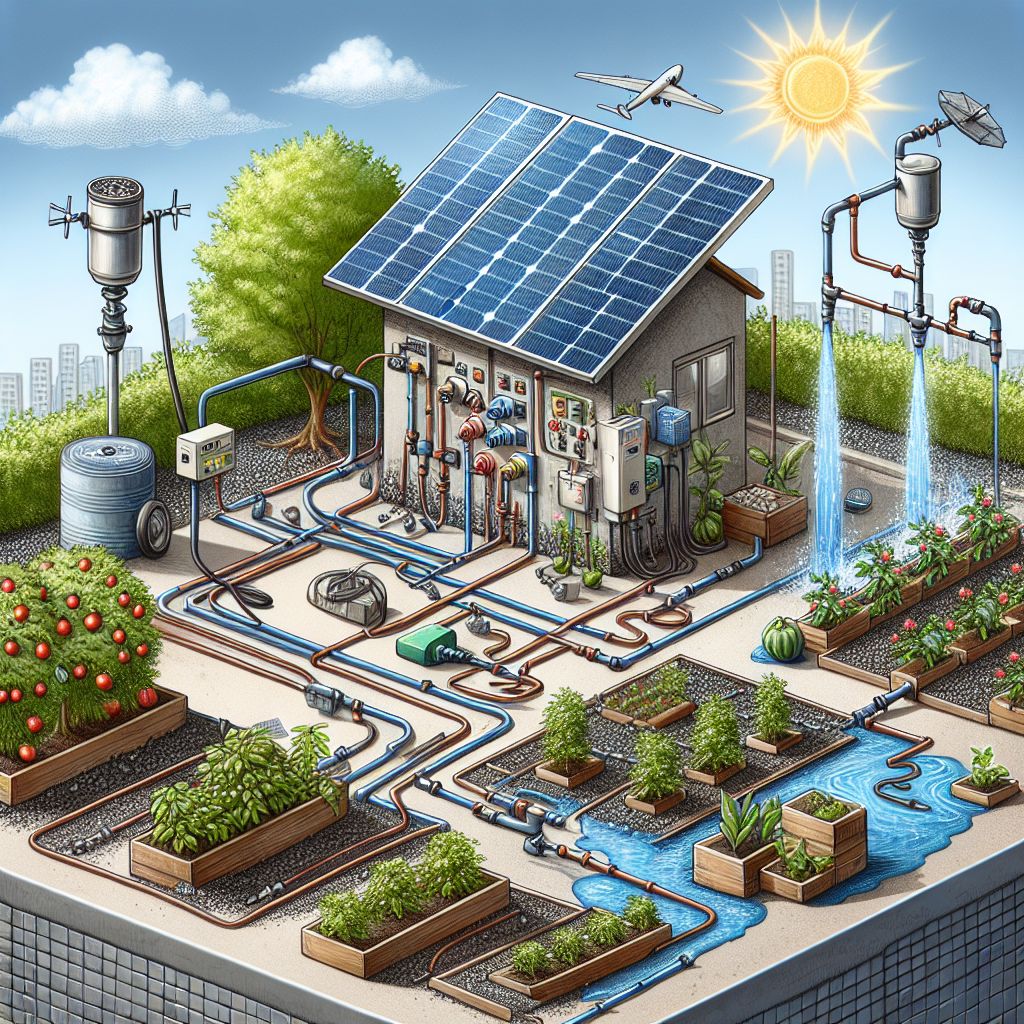
Constructing a Solar Irrigation System for Your Rooftop Garden
Feeling bold enough to create your own solar irrigation system? It might seem overwhelming at first, but if you tackle it one step at a time, you’ll soon have a self-sufficient garden that’s good for the environment and your wallet.
Selecting the Best Solar Panels for Your Rooftop Garden Irrigation System
Your solar panels are the backbone of your irrigation system. They take sunlight and convert it into the electricity that drives your water pump. Here are some things to think about when choosing solar panels:
|
Consideration |
Explanation |
|---|---|
|
Solar Panel Size |
The size of the solar panel(s) should be matched to the power requirements of your irrigation system. Larger gardens or more extensive watering needs will require higher wattage solar panels. 1, 2, 3 |
|
Solar Panel Efficiency |
More efficient solar panels will generate more power from the same amount of sunlight, improving the performance and reliability of your irrigation system. Look for panels with high efficiency ratings. 1, 2, 3 |
|
Solar Panel Placement |
The solar panels should be placed in a location on the rooftop that receives maximum sunlight exposure throughout the day. Shading can significantly reduce solar panel output. 1, 2, 3 |
|
Battery Capacity |
If your irrigation system includes battery storage, ensure the battery capacity is sufficient to power the system during periods of low sunlight or at night. More battery capacity provides longer runtime. 1, 2, 3 |
|
Weatherproofing |
The solar panels and other components must be weatherproof and able to withstand outdoor conditions like rain, wind, and temperature extremes on the rooftop. Look for rugged, outdoor-rated equipment. 1, 2, 3 |
|
Ease of Installation |
Choose a solar panel system that is easy to install on the rooftop without complex wiring or plumbing requirements. Modular, plug-and-play designs are preferable. 1, 2, 3 |
Key factors to consider when selecting solar panels for a rooftop garden irrigation system, including size, efficiency, placement, battery capacity, weatherproofing, and installation complexity.
You want to make sure the amount of power your solar panels make matches the amount of power your pump needs. That way, your garden gets enough water and you’re using as much of the solar power you’re making as you can.
Setting Up Drip or Sprinkler Systems on a Rooftop
Once your solar panels are installed, the next thing to do is to install the irrigation system. Drip systems are perfect for rooftop gardens because they provide water directly to the base of the plant, minimizing waste. Sprinkler systems, however, can cover a wider area and are better for larger rooftop spaces.
Make sure your irrigation system is set up in a way that it waters your entire garden evenly, without wasting water. It’s important to make sure the system is balanced so no one area gets too much or too little water.
Linking Solar Energy to Rooftop Garden Water Systems
The last stage in activating your solar irrigation system is linking the solar panels to the pump. This requires the installation of a battery to store the solar energy, which will then drive the pump. A charge controller is also needed to stop the battery from overcharging, guaranteeing a long lifespan for your system.
After setting up the connections, check the system to confirm that water is flowing through the irrigation system as planned. Make any required changes to ensure your rooftop garden is getting the right amount of water.
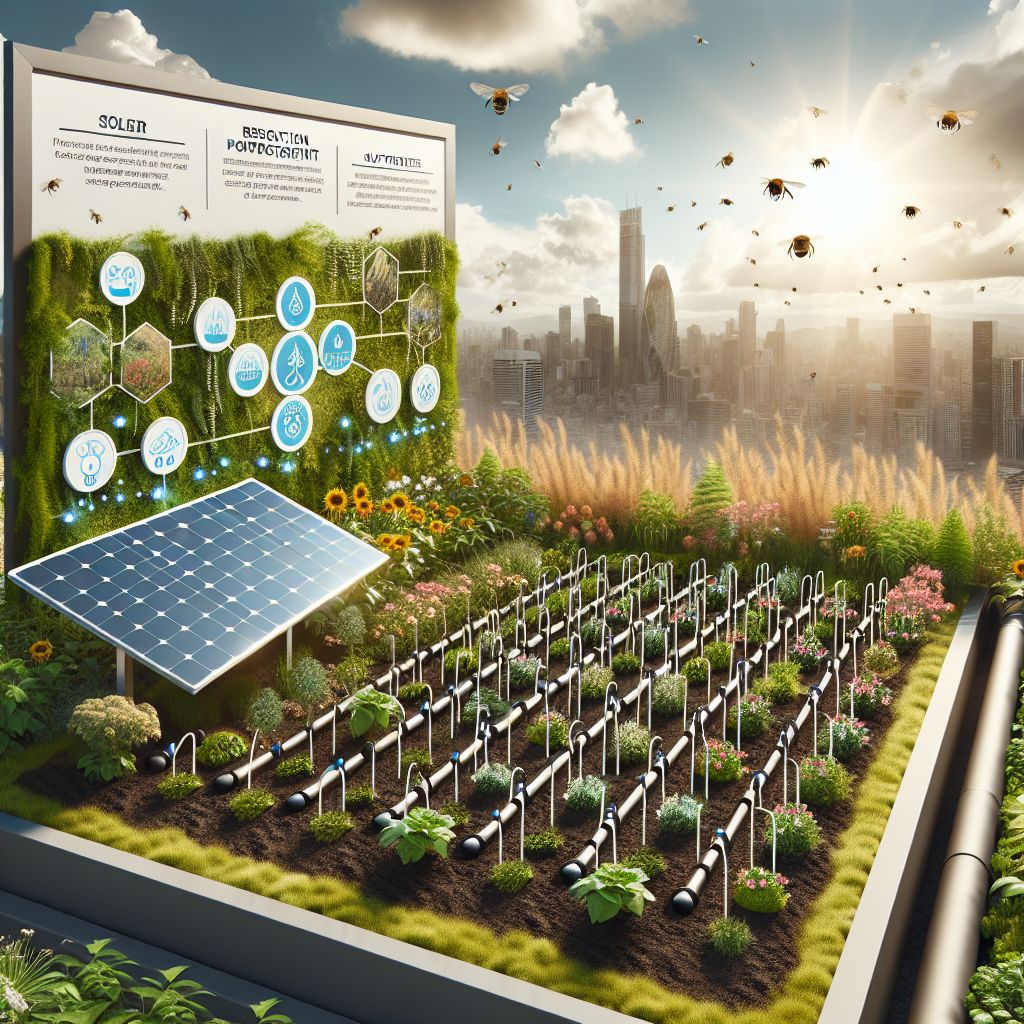
Going Green: Environmental Perks
Choosing a rooftop solar irrigation system is not just about watering your plants; it’s a declaration of your dedication to the environment. The advantages of this system are numerous, from shrinking your carbon footprint to supporting urban biodiversity. Here, we delve into the environmental benefits of using solar power to maintain your rooftop garden.
Preserving Natural Resources
Water is an invaluable resource, and utilizing solar irrigation systems can result in a significant decrease in water use. With a drip irrigation system, water is delivered directly to the roots of the plants, drop by drop, which greatly reduces waste. Solar power, a clean and renewable energy source, eliminates the need for electricity derived from fossil fuels, further preserving natural resources.
Societal and Environmental Advantages
Looking beyond your own rooftop, solar irrigation systems play a role in the health of the broader community. Green roofs have the ability to decrease urban air temperatures, mitigate the urban heat island effect, and provide habitats for pollinators and other wildlife. By installing a solar irrigation system, you’re not just caring for your own garden, you’re also helping the larger ecosystem and promoting a healthier urban environment.
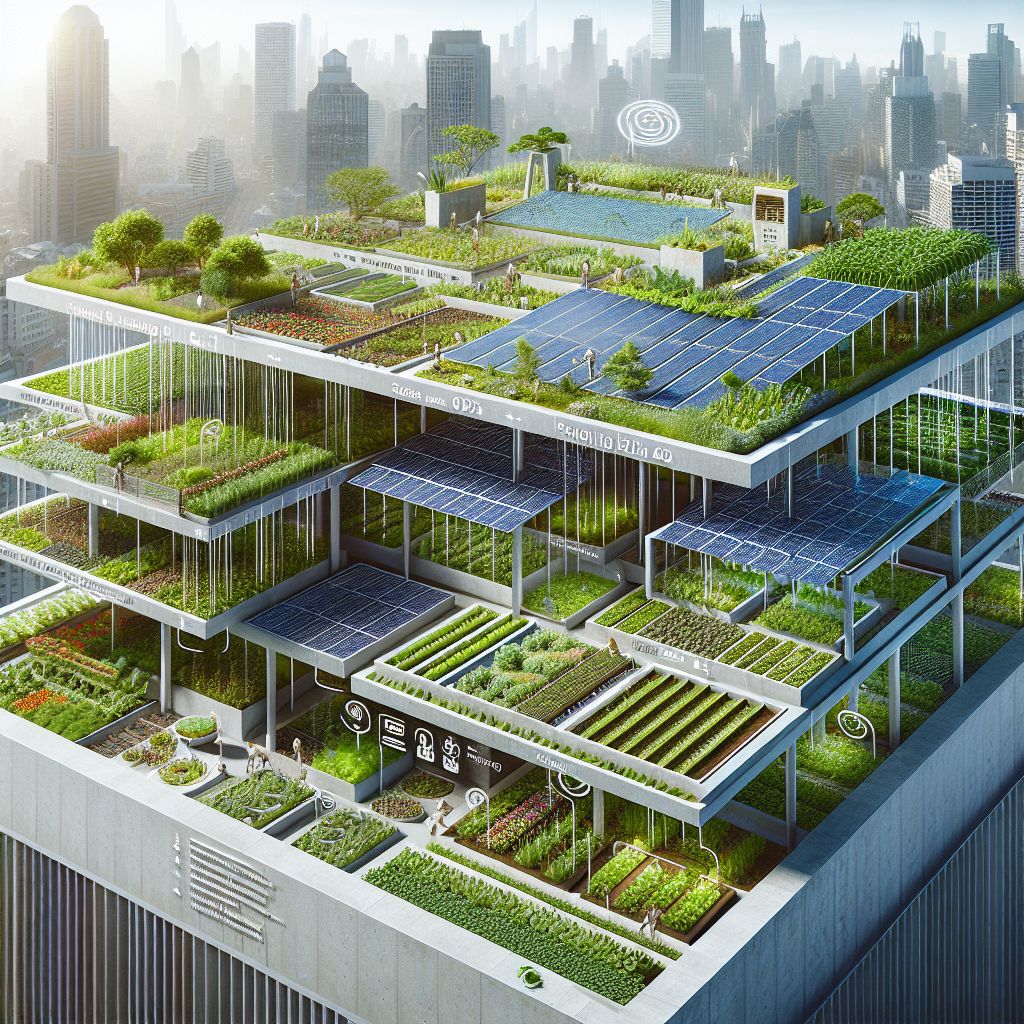
Maximizing Your Rooftop Space
Rooftop gardens are a great way to make use of space that would otherwise be wasted. But when you incorporate solar irrigation into the mix, you’re taking your rooftop from just a garden to a self-sustaining ecosystem. Here’s how you can turn your rooftop into an example of urban sustainability.
Start by checking out your rooftop’s potential. Consider the amount of sunlight it gets, the space it has, and the weight it can bear. With these factors in mind, plan your garden and select plants that will do well in the conditions you have.
Next, think about how you will install your solar panels and irrigation system to optimize efficiency. You want to soak up as much sunlight as possible while also making sure your plants are getting the correct amount of water – not too much and not too little.
Optimizing Small Spaces for Sustainability
Even the tiniest rooftop can transform into a green oasis with the proper strategy. By employing vertical gardening methods and selecting compact, high-yield plants, you can maximize the use of limited space. A solar irrigation system can be adjusted to match the size of your garden, guaranteeing that every square inch of soil is fruitful and every ounce of water is put to good use.
Don’t forget about the beauty and leisure benefits of your rooftop garden either. If you plan it well, your space could become not only a place to grow fresh food, but also a place to unwind and have fun—a green oasis in the middle of the city.
Finally, get your community involved. Share your experiences and knowledge about solar irrigation systems. Your rooftop garden could inspire your neighbors and local businesses to consider their own green initiatives, leading to a ripple effect of sustainability across the city.
- Evaluate your rooftop’s solar energy and gardening potential.
Plan your garden to maximize space and sunlight.
Use vertical gardening methods for limited spaces.
Size your solar irrigation system to fit your garden.
Use your rooftop garden as a model for community sustainability.
Greening the Urban Landscape
As urban populations increase, so does the need for green spaces. Rooftop gardens with solar irrigation systems can help create a more sustainable urban environment. They not only offer fresh produce and greenery, but they also help decrease stormwater runoff, enhance air quality, and combat the urban heat island effect.
By turning your rooftop into a productive garden, you’re contributing to the creation of a patchwork of green spaces that can help to transform the urban environment. This network of rooftop gardens can become a vital component of city infrastructure, providing ecological, social, and economic benefits.
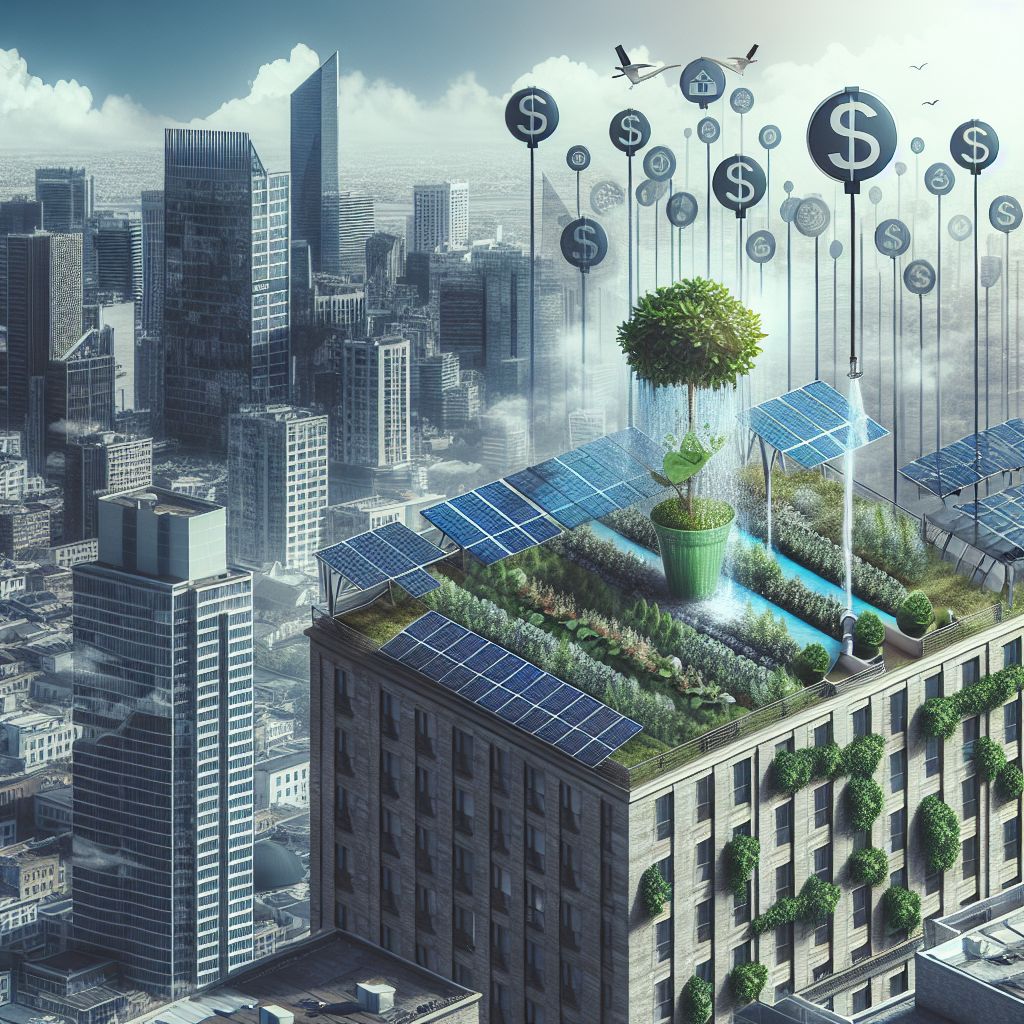
ROI: Is a Solar Irrigation System Worth the Investment?
Installing a rooftop solar irrigation system is a big decision, and a big part of that decision is understanding the return on investment (ROI). While the initial costs may be high, the potential savings over time and the positive impact on the environment can make it a sound investment. Let’s take a closer look at the financial implications to help you make a more informed decision.
- Upfront costs of solar panels, irrigation system, and installation.
Long-term savings on water and electricity costs.
Potential property value increase due to the addition of a green roof.
Government incentives and rebates for renewable energy installations.
Lower maintenance costs compared to traditional roofing materials.
By taking these factors into account, you can decide if a solar irrigation system is the right fit for your rooftop garden. In many instances, the combination of lower utility costs, higher property value, and environmental benefits will result in a positive ROI over time.
To sum it up, investing in a rooftop solar irrigation system isn’t just about improving your garden; it’s about investing in the future of our planet. By choosing to do this, you’re joining a growing number of city dwellers who are converting their rooftops into sustainable ecosystems that benefit everyone.
Final Thoughts:
Overall, turning your rooftop into a green oasis with a solar irrigation system is a smart and progressive decision. It doesn’t just offer a sustainable way to care for your garden, but also helps our environment and enhances the look of our cityscapes.
Choosing solar irrigation means you’re contributing to a more sustainable future, one rooftop at a time.
No matter if you’re a city gardener, a homeowner with a green thumb, or a city planner, the advantages of a rooftop solar irrigation system are obvious and persuasive. It’s a wise investment that benefits both the Earth and your wallet.
So, make the change. Turn your rooftop into a green haven that saves water, conserves energy, and adds a bit of nature to the urban landscape. Your rooftop garden is ready for the sunlight to become a self-sustaining paradise in the sky.
FAQ
Considering installing a rooftop solar irrigation system? You might be wondering about the cost, how it’s installed, what plants it’s suitable for, how the weather affects it, and what kind of maintenance it requires. Here are some answers to your most burning questions:
What is the Price Range for Rooftop Solar Irrigation Systems?
The price of a rooftop solar irrigation system can fluctuate greatly depending on certain factors. These include the size of the system, the type of plants you plan on growing, and how complex the installation process is. For a detailed analysis, you might want to consider looking into the economics of solar-powered water systems. The price range can be anywhere from a couple hundred dollars to several thousand dollars.
For a basic, small system, you may only need to shell out $200-$500.
If you’re looking for a more comprehensive system with several panels and a bigger irrigation network, you might need to budget anywhere from $2,000-$5,000.
Keep in mind that you might be able to offset some of these costs with rebates and incentives!
Keep in mind that the money you’ll save on water and electricity over time will help offset these upfront costs.
Can I Put in a Solar Irrigation System on My Own?
While a DIY enthusiast can certainly put in a solar irrigation system, it’s important to have a solid understanding of both solar power systems and irrigation methods. If you’re not sure about your skills, it’s best to bring in the pros to make sure the system is put in right and safely.
Should you choose to undertake the installation process on your own, it’s crucial to closely follow all the provided instructions and comply with your local building codes and regulations. Keep in mind that the safety and effectiveness of your system are reliant on a proper installation. For further guidance, consider reviewing our efficient watering solutions setup guide.
If you’re new to this, there are several firms that provide comprehensive installation services for solar irrigation systems. This can give you a sense of security and ensure that your system is running at maximum efficiency.
Can Solar Irrigation Work for Any Kind of Plant?
Solar irrigation is adaptable to many types of plants, making it a flexible choice for gardeners. The secret is to tweak the watering schedule and system settings to fit the unique needs of your plants.
No matter if you are growing sensitive flowers, robust vegetables, or a combination of plants, you can set up your solar irrigation system to deliver the correct amount of water at the right times, guaranteeing your garden flourishes.
What Impact Does Weather Have on Rooftop Solar Irrigation?
The weather can play a significant role in how well your solar irrigation system functions. For example, if it’s cloudy or rainy for an extended period, your panels may not be able to collect as much solar energy. But if your system is well-designed and has enough battery storage, it can still work during these times by using the energy it has stored.
Additionally, you must guarantee that your system is strong enough to endure local weather conditions, like strong winds or heavy snow. Regular upkeep can help tackle any weather-related problems and keep your system working efficiently.
Do They Require Any Maintenance?
While rooftop solar irrigation systems usually require little maintenance, it is essential to keep them running smoothly and for a long time. Here are some tips to help you:
Always check your solar panels for any dust or rubbish that could obstruct the sun’s rays. A quick clean can frequently boost performance.
Inspect the irrigation lines for any leaks or blockages that could stop water from getting to your plants.
Keep an eye on the battery storage system to make sure it’s charging properly and working as it should.
Regularly check the pump and other mechanical components for any signs of damage, and promptly replace or repair them if necessary.
With a few easy upkeep tasks, your rooftop solar irrigation system will continue to be a valuable asset for you and your garden for many years.

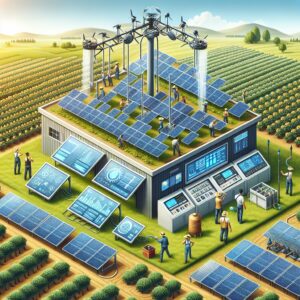
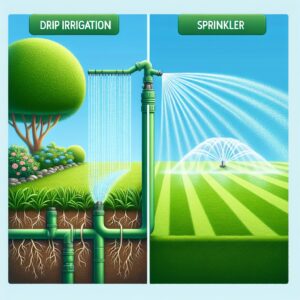


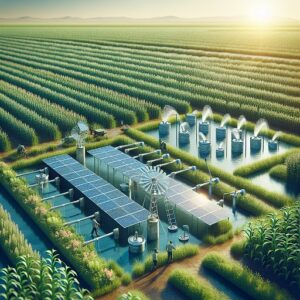
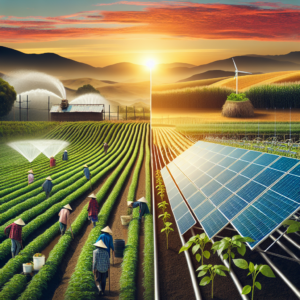
Leave a Reply